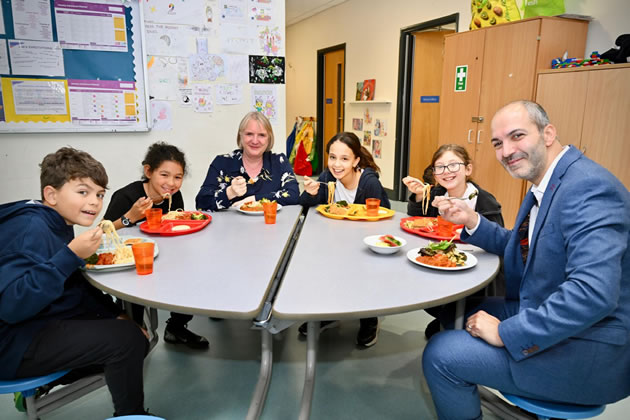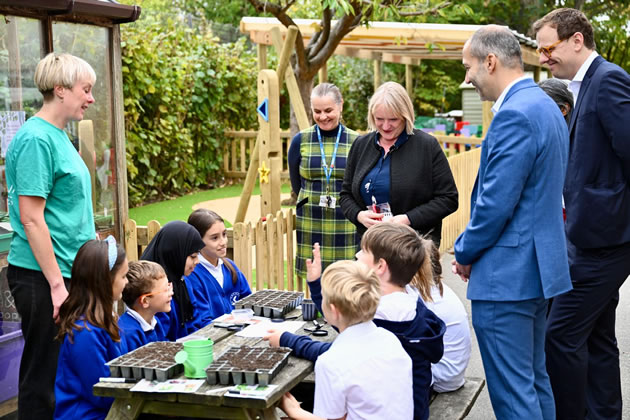Deputy Mayor Visits Grange Primary School
Joanne McCartney there to see the impact of universal free school meals

The Deputy Mayor eats lunch with Grange school children and local Assembly Member Bassam Mahfouz. Picture: Greater London Authority
October 7, 2025
London’s Deputy Mayor for Children and Families, Joanne McCartney, visited Grange Primary School in Ealing this week to celebrate the impact of the Mayor of London’s Universal Free School Meals programme, which provides free lunches to all pupils in state primary schools across the capital.
During the visit, she joined the school’s gardening club, where pupils explored how fruit and vegetables travel from garden to table. She also met teaching and catering staff to discuss how the initiative is supporting children’s health, wellbeing, and learning.
Launched in 2023, the scheme has delivered more than four million free school meals across Ealing’s primary schools, helping families save up to £500 per child per year. The Mayor’s office describes the programme as a historic intervention aimed at tackling child hunger and supporting household budgets amid rising living costs.
Joanne McCartney said, “It was wonderful to visit Grange Primary and see how the Mayor’s unprecedented funding of free school meals is making a difference to children and families in Ealing. It’s inspiring to see young Londoners learning about where their food comes from, and how schools are embedding healthy, sustainable eating into everyday life.”
An independent report published by Impact on Urban Health in 2024 found that universal free school meals in London had a positive effect on children’s health, school engagement, and family wellbeing. The study highlighted improvements in nutrition, reduced stigma around meal access, and stronger school communities. It also noted that the scheme helped alleviate financial pressure for working families, particularly those just above the threshold for means-tested support.

The Deputy Mayor on a tour of the school with Bassam Mahfouz and council leader Peter Mason. Picture: Greater London Authority
While the programme has been welcomed by many schools and families, it has also prompted debate over funding priorities and long-term sustainability. Critics, including some opposition Assembly Members, have questioned whether the Mayor’s budget should be used to fund a scheme that traditionally falls under national government responsibility.
Conservative London Assembly Member Neil Garratt previously argued that the Mayor should focus on core transport and policing responsibilities, stating, “This is a national policy area. If the Mayor wants to fund free school meals, he should lobby government rather than diverting City Hall resources.”
Others have raised concerns about whether the scheme reaches children most in need, suggesting that targeted support might be more effective than universal provision.
In response, the Mayor’s office has defended the programme as a universal safety net that ensures no child goes hungry at school, regardless of background or fluctuating family income. The scheme is currently funded through a combination of City Hall reserves and discretionary spending, with calls for central government to adopt and expand the model nationally.
The Mayor’s office has not yet confirmed whether the scheme will continue beyond the current funding cycle, but discussions are ongoing with boroughs and education leaders.
Like Reading Articles Like This? Help Us Produce More This site remains committed to providing local community news and public interest journalism. Articles such as the one above are integral to what we do. We aim to feature as much as possible on local societies, charities based in the area, fundraising efforts by residents, community-based initiatives and even helping people find missing pets. We’ve always done that and won’t be changing, in fact we’d like to do more. However, the readership that these stories generates is often below that needed to cover the cost of producing them. Our financial resources are limited and the local media environment is intensely competitive so there is a constraint on what we can do. We are therefore asking our readers to consider offering financial support to these efforts. Any money given will help support community and public interest news and the expansion of our coverage in this area. A suggested monthly payment is £8 but we would be grateful for any amount for instance if you think this site offers the equivalent value of a subscription to a daily printed newspaper you may wish to consider £20 per month. If neither of these amounts is suitable for you then contact info@neighbournet.com and we can set up an alternative. All payments are made through a secure web site. One-off donations are also appreciated. Choose The Amount You Wish To Contribute. If you do support us in this way we’d be interested to hear what kind of articles you would like to see more of on the site – send your suggestions to the editor. For businesses we offer the chance to be a corporate sponsor of community content on the site. For £30 plus VAT per month you will be the designated sponsor of at least one article a month with your logo appearing if supplied. If there is a specific community group or initiative you’d like to support we can make sure your sponsorship is featured on related content for a one off payment of £50 plus VAT. All payments are made through a secure web site. |